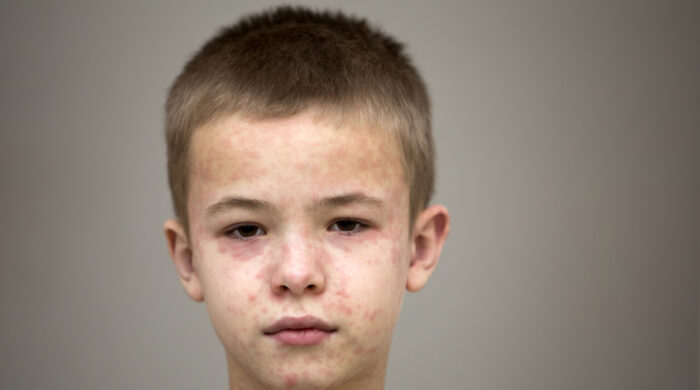With the recent measles outbreak spreading across the U.S., now is the perfect time to check and be sure that all of your children’s health immunizations are up to date.
Even if your child isn’t considered at a high risk for the measles, they can still be a carrier, which could endanger those in more vulnerable health populations – such as the elderly, individuals with compromised immune systems, and infants who aren’t yet old enough to be vaccinated.
The best way to prevent your child from getting measles is to have them immunized according to the guidelines set forth by the Centers for Disease Control (CDC). Read on to learn more about what measles is, common treatments, and available vaccines.
What are Measles?
Measles (also known as rubeola) is a highly contagious, infectious disease that is most common in childhood although anyone can get it. Measles causes red rashes to appear on the skin and is accompanied by other symptoms, as detailed below.
The effects of measles in otherwise healthy individuals are usually short-term, but can be accompanied by a variety of symptoms that may develop into more severe health issues.
Signs and Symptoms
If you’re concerned that your child has been exposed to the measles, watch for any symptoms to occur 10-14 days after the exposure. Here are the tell-tale signs of measles:
Stage 1
Stage 1 symptoms of measles are similar to the symptoms of a cold:
- Dry cough
- Runny nose
- Watery or inflamed eyes (conjunctivitis)
- High fever
- Sore throat
Stage 2
- Tiny white spots inside the mouth
Stage 3
- A rash of flat red spots that typically starts on the face and moves further down the body as the disease progresses
- Small, raised bumps on top of the rash
- Rash clusters that spread and join together
- Increasing fever, up to 104 degrees
Other symptoms may include: muscle pain, fatigue, sensitivity to light, reduced appetite and irritability.
In serious cases, measles can lead to ear infections, diarrhea and/or pneumonia. In the most severe cases, a patient may suffer complications that lead to permanent health problems or even death.
Guidelines For Parents and Caregivers
If your child has measles, don’t hesitate to contact a healthcare provider. They can answer your questions or concerns, and offer treatment options.
To care for your child at home, give them plenty of fluids and encourage a lot of rest. Over-the-counter non-aspirin fever medications can also be used to alleviate symptoms and make the child more comfortable.
If the child has trouble breathing, severe vomiting or diarrhea, or develops a bad headache, neck stiffness, or chest pain, take them to the Emergency Room.
Keep in mind that the best way to prevent your child from contracting measles is to keep them up to date with their vaccinations.
What are the MMR and MMRV vaccines?
The Measles Mumps Rubella (MMR) vaccine offers a safe and effective protection against the disease. The recommended dosages of the vaccine should be administered first between the ages of 12 – 15 months, and the second vaccine should be given when the child is between four to six years of age.
The Measles Mumps Rubella Varicella (MMRV) vaccine is a combination of the MMR vaccine and the varicella vaccine. The varicella vaccine was created to protect children from getting chickenpox.
The age guidelines for this combination vaccine are the same as the MMR, so parents and guardians should talk to their healthcare provider about which vaccine is right for their child(ren).
Who should get the Measles vaccine?
Children between the ages of 12 months – 6 years (as stated above) should get either the MMR or MMRV vaccine. Alternately, students attending college, as well as healthcare personnel, international travelers and those at an increased risk during an outbreak who do not already have evidence of immunity should also be vaccinated.
Where to get a Measles vaccine
If your child (or anyone else in your family) is in need of a measles vaccine, request an appointment with one of our primary care providers. We look forward to supporting you and your family in good health.
